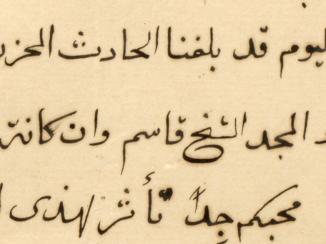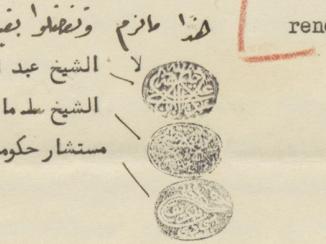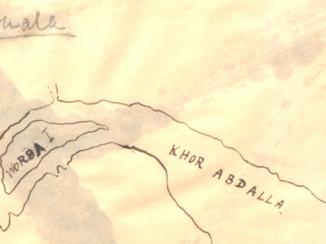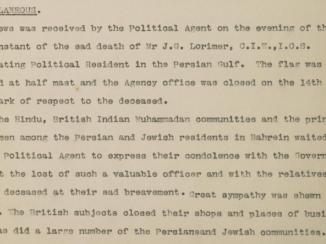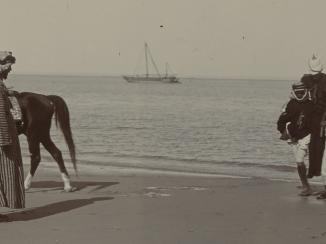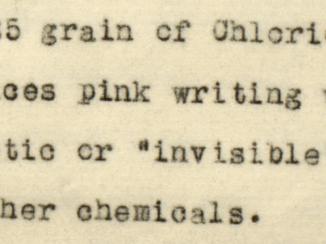Overview
Although Queen Victoria never set foot on the soil of the empire over which she was proclaimed Empress of India in 1877, her presence was felt in many ways. Her face could be found on currency and postage stamps, while portraits and statues of the monarch were present in administrative buildings throughout the empire.
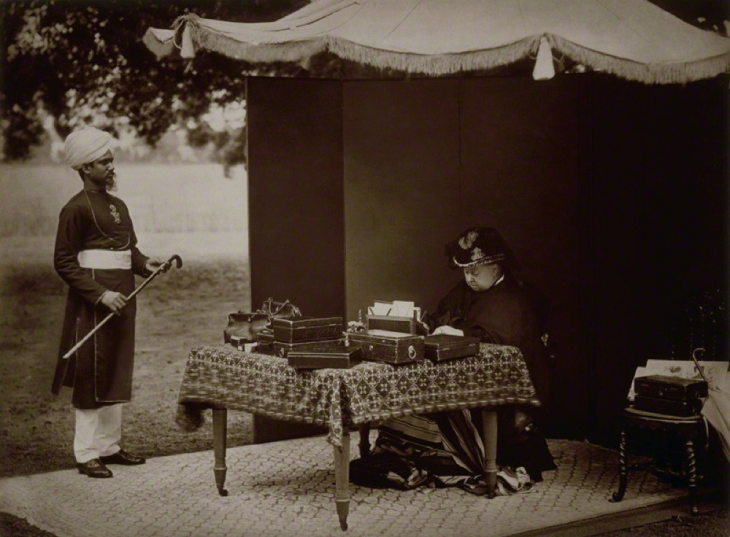
Indeed, her birthday on 24 May was recognised and considered a ‘momentous event’, an occasion worthy of celebration. At Residencies and Agencies, such as the headquarters of Britain’s colonial administration, the Political Residency An office of the East India Company and, later, of the British Raj, established in the provinces and regions considered part of, or under the influence of, British India. in the Persian Gulf The historical term used to describe the body of water between the Arabian Peninsula and Iran. at Bushire, the flag-staffs were ceremonially ‘dressed’, gun salutes were fired, and complimentary messages expressing ‘unity’ and ‘friendship’ were sent to local officials, such as Ahmad Khan, the Governor of Bushire.
When Queen Victoria died on 22 January 1901, a sense of loss was not just felt in Britain but throughout the Empire. As John Wolffe notes in his book Great Deaths, reactions were ‘immediate and tangible’ with a ‘sombre mood and suspension of normal activity’. This atmosphere was reflected in the customs of mourning and commemoration – many of which the late queen had been associated with when mourning her own husband, Prince Albert – that were undertaken throughout the empire to mark her death.
Mourning: Instructions to a Native Agent
Once news of the monarch’s death had reached the British Residency An office of the East India Company and, later, of the British Raj, established in the provinces and regions considered part of, or under the influence of, British India. at Bushire, details were transmitted to its network of native agents Non-British agents affiliated with the British Government. on both the Arab and Persian littorals, including Khan Bahadur ‘Abd al-Latif, Britain’s Residency An office of the East India Company and, later, of the British Raj, established in the provinces and regions considered part of, or under the influence of, British India. Agent on the Trucial Coast A name used by Britain from the nineteenth century to 1971 to refer to the present-day United Arab Emirates. at Sharjah, in modern-day United Arab Emirates. W. S. Davis, First Assistant to the Political Resident A senior ranking political representative (equivalent to a Consul General) from the diplomatic corps of the Government of India or one of its subordinate provincial governments, in charge of a Political Residency. , wrote:
It is with profound regret that the Political Resident A senior ranking political representative (equivalent to a Consul General) from the diplomatic corps of the Government of India or one of its subordinate provincial governments, in charge of a Political Residency. and Consul General has directed me to announce to you the death on the 22 of January 1901 of Her Most Gracious Majesty Queen Victoria, Queen of the United Kingdom of Great Britain and Ireland and Empress of India.
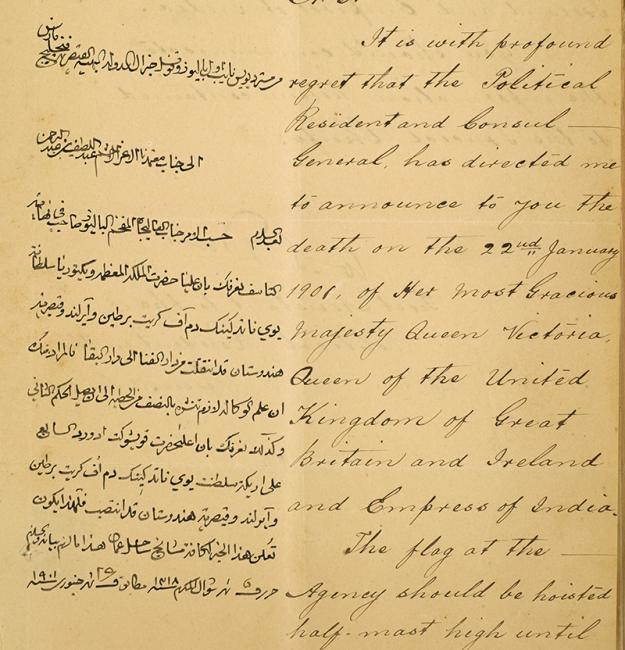
While this solemn news was to be communicated to the Trucial Coast A name used by Britain from the nineteenth century to 1971 to refer to the present-day United Arab Emirates. Shaikhs and other notables, instructions for mourning, which were to be observed by the Native Agent Non-British agents affiliated with the British Government. himself, also appeared in the same letter. For example, the flag at the Agency An office of the East India Company and, later, of the British Raj, headed by an agent. should be ‘hoisted half-mast high until further notice’.
Subsequently, facsimiles of a Gazette Extraordinary were forwarded to ‘Abd al-Latif with further instructions: ‘All persons will remain in deep mourning up to March 6 inclusive and in half mourning up to April 17 inclusive’. In addition, ‘Officers of His Majesty’s Civil, Military and Marine services will when in uniform wear a band of crape on the left arm up to July 24th inclusive’.
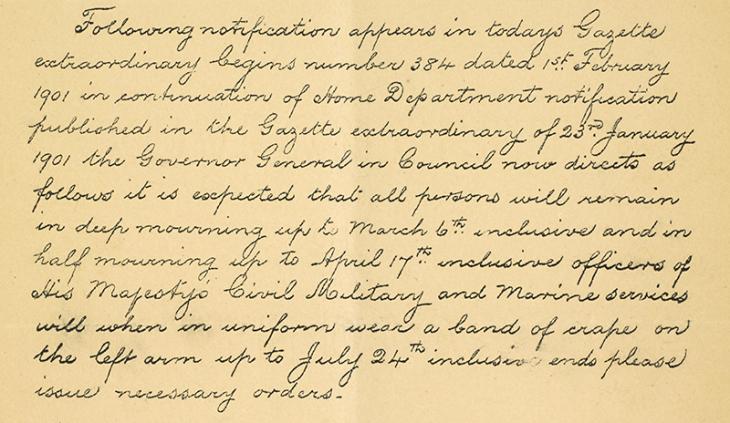
On 1 March, the Residency An office of the East India Company and, later, of the British Raj, established in the provinces and regions considered part of, or under the influence of, British India. forwarded to ‘Abd al-Latif ‘[two] quires of black-edged foolscap paper’, informing him that ‘it should be used in all your official correspondence up to the 24 July 1901’.
Succession and Coronation
Upon the death of Queen Victoria, it was immediately announced that her son, Albert Edward, had been proclaimed King Edward VII of the United Kingdom of Great Britain and Ireland and Emperor of India.
In May the following year, Captain Hunt wrote again to ‘Abd al-Latif informing him that the date for the coronation of ‘His Imperial Majesty Edward VII’ was scheduled for 26 June 1902 which shall be ‘observed as a general holiday’. However, at short-notice, the date of the coronation was postponed until 9 August 1902 as the King was taken ill with an abdominal abscess that required immediate surgery.

Lost in Translation?
Many of these customs were peculiarly British or European in nature and may have been lost in their ambiguous translation into Arabic or appeared culturally obscure on the Trucial Coast A name used by Britain from the nineteenth century to 1971 to refer to the present-day United Arab Emirates. at the turn of the century.
Yet, adherence to such practices, as Bernard S. Cohn notes, constituted a ‘ritual idiom’, performed to express and make manifest and compelling Britain’s construction of colonial authority. Such rituals helped to locate both colonial administrators in the Bushire Residency An office of the East India Company and, later, of the British Raj, established in the provinces and regions considered part of, or under the influence of, British India. and native agents Non-British agents affiliated with the British Government. like ‘Abd al-Latif in an imperial hierarchy that was presided over by the monarch-empress.
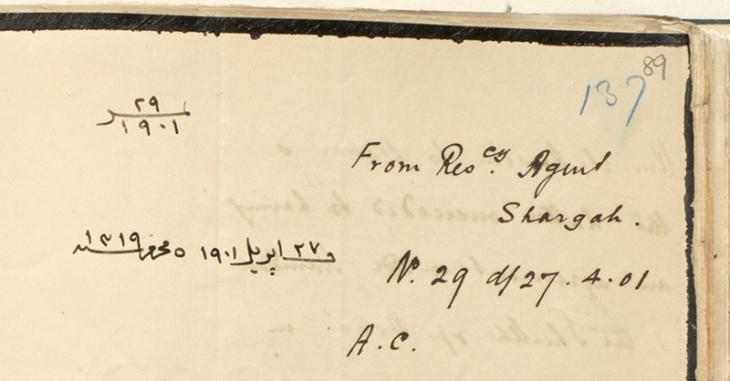
It is almost impossible to know exactly how and to what extent ‘Abd al-Latif interpreted and performed these mourning practices, but a letter from him to the Resident, dated 27 April 1901 / 5 Muharram 1319, written on the black-edged mourning paper provided by the Residency An office of the East India Company and, later, of the British Raj, established in the provinces and regions considered part of, or under the influence of, British India. , shows that at the very least, he carried out his instructions dutifully.



